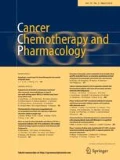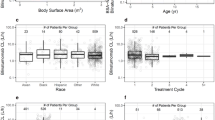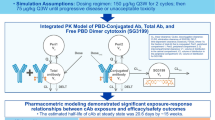Abstract
Purpose
Because of the observed success of phase I/II trials, the novel anti-CD30 agent brentuximab vedotin is now being evaluated as a frontline agent in the high-risk pediatric Hodgkin lymphoma trial HLHR13. The objectives of this study were to evaluate the pharmacokinetic variability during weekly dosing of 1.2 mg/kg of brentuximab vedotin, determine factors that may explain this variability, compare our drug exposure with published data, and evaluate toxicity of brentuximab vedotin in the pediatric population.
Methods
Brentuximab vedotin, MMAE and anti-therapeutic antibody levels were measured in the serum samples of 16 pediatric patients with Hodgkin lymphoma. A compartmental pharmacokinetic model was fit to the data by using nonlinear mixed-effects modeling.
Results
Clearance and volume of brentuximab vedotin were significantly correlated with weight (p < .001), which was responsible for over 60% of the parameters inter-individual variability. Clearance and volume were higher in boys compared to girls (p = 0.08 and p = 0.03, respectively). Brentuximab vedotin’s AUC and C max were lower in our pediatric study than those reported in adult studies (25 and 11%, respectively). Toxicity was comparable to that of the standard-of-care backbone using vincristine instead of brentuximab vedotin. The sera of all 16 patients remained negative for anti-therapeutic antibodies during and at the end of therapy.
Conclusions
As in previous studies, weight continues to be the most significant factor explaining brentuximab vedotin’s pharmacokinetic variability in pediatric patients. Exposure to weekly dosing appears to be safe and tolerable in pediatric patients.


Similar content being viewed by others
References
Kelly KM et al (2013) Children’s Oncology Group’s 2013 blueprint for research: Hodgkin lymphoma. Pediatr Blood Cancer 60(6):972–978
Fanale MA et al. (2012) A phase I weekly dosing study of brentuximab vedotin in patients with relapsed/refractory CD30-positive hematologic malignancies. Clin Cancer Res 18(1):248–255
Teicher BA, Chari RV (2011) Antibody conjugate therapeutics: challenges and potential. Clin Cancer Res 17(20):6389–6397
Seattle Genetics Inc. (2012) Adcetris (brentuximab vedotin) product information. Seattle Genetics Inc., Bothell
Katz J, Janik JE, Younes A (2011) Brentuximab vedotin (SGN-35). Clin Cancer Res 17(20):6428–6436
Younes A (2011) CD30-targeted antibody therapy. Curr Opin Oncol 23(6):587–593
Jackson D, Stover D (2015) Using the lessons learned from the clinic to improve the preclinical development of antibody drug conjugates. Pharm Res 32(11):3458–3469
Ogura M et al (2014) Phase I/II study of brentuximab vedotin in Japanese patients with relapsed or refractory CD30-positive Hodgkin’s lymphoma or systemic anaplastic large-cell lymphoma. Cancer Sci 105(7):840–846
Younes A et al (2010) Brentuximab vedotin (SGN-35) for relapsed CD30-positive lymphomas. N Engl J Med 363(19):1812–1821
Gopal AK et al (2012) Safety and efficacy of brentuximab vedotin for Hodgkin lymphoma recurring after allogeneic stem cell transplantation. Blood 120(3):560–568
Younes A et al (2012) Results of a pivotal phase II study of brentuximab vedotin for patients with relapsed or refractory Hodgkin’s lymphoma. J Clin Oncol 30(18):2183–2189
Gopal AK et al (2015) Durable remissions in a pivotal phase 2 study of brentuximab vedotin in relapsed or refractory Hodgkin lymphoma. Blood 125(8):1236–1243
Mauz-Korholz C et al (2010) Procarbazine-free OEPA-COPDAC chemotherapy in boys and standard OPPA-COPP in girls have comparable effectiveness in pediatric Hodgkin’s lymphoma: the GPOH-HD-2002 study. J Clin Oncol 28(23):3680–3686
Fanale M, Franklin A, Radhakrishnan R, Termuhklen A, Gopal AK, Shustiv A et al (2011) Complete remissions observed in a subset of pediatric patients with CD30-expressing malignant lymphomas treated in clinical studies of brentuximab vedotin (SGN-35). European Multidisciplinary Cancer Congress, Stockhold
Han TH, Kennedy DA, Hayes S, Lynch CM (2012) The pharmacokinetics of brentuximab vedotin (SGN-35), an antibody-drug conjugate (ADC). American Society for Clinical Pharmacology and Therapeutics Annual Meeting, Washington
Locatelli F, Neville K, Rosolen A, Landman-Parker J, Aladjidi N, Beishuizen A, Daw S, Gore L, Franklin ARK, Fansanmade A, Wang J, Sachs J, Mauz-Korholz C (2014) Phase 1/2 study of brentuximab vedotin in pediatric Pts with relapsed/refractory (R/R) Hodgkin lymphoma (HL) or systemic anaplastic large-cell lymphoma (sALCL): preliminary phase 2 HL data. Klin Padiatr 226:O_20
Neville K, Gore L, Mauz-Körholz C, Rosolen A, Landman-Parker J, Sanchez de Toledo J, Beishuizen A, Keating Franklin AR, Fasanmade A, Wang J, Huebner D, Locatelli F (2013) Phase I/II study of brentuximab vedotin in pediatric patients (pts) with relapsed or refractory (RR) Hodgkin lymphoma (HL) or systemic anaplastic large-cell lymphoma (sALCL): interim phase (ph) I safety data. J Clin Oncol 31(suppl; abstr ):10028
http://www.accessdata.fda.gov/drugsatfda_docs/nda/2011/125388Orig1s000ChemR.pdf
de Claro RA et al (2012) U.S. food and drug administration approval summary: brentuximab vedotin for the treatment of relapsed hodgkin lymphoma or relapsed systemic anaplastic large-cell lymphoma. Clin Cancer Res 18(21):5845–5849
Acknowledgements
This study was supported in part by the NIH Cancer Center Support Grant CA21765 and the American Lebanese Syrian Associated Charities (ALSAC).
Author information
Authors and Affiliations
Corresponding author
Ethics declarations
Conflict of interest
The authors declare that they have no conflict of interest.
Electronic supplementary material
Below is the link to the electronic supplementary material.
Rights and permissions
About this article
Cite this article
Flerlage, J.E., Metzger, M.L., Wu, J. et al. Pharmacokinetics, immunogenicity, and safety of weekly dosing of brentuximab vedotin in pediatric patients with Hodgkin lymphoma. Cancer Chemother Pharmacol 78, 1217–1223 (2016). https://doi.org/10.1007/s00280-016-3180-x
Received:
Accepted:
Published:
Issue Date:
DOI: https://doi.org/10.1007/s00280-016-3180-x




